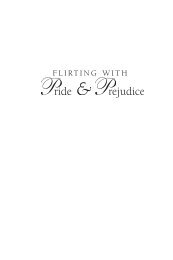Edited by Scott Westerfeld - Teen Libris
Edited by Scott Westerfeld - Teen Libris
Edited by Scott Westerfeld - Teen Libris
You also want an ePaper? Increase the reach of your titles
YUMPU automatically turns print PDFs into web optimized ePapers that Google loves.
Pants on Fire 11<br />
These particles are conscious. They interact with our thoughts. “‘The<br />
Shadows flock to your thinking like birds,’” Mary says (TSK 78). But you<br />
can’t receive them unless you’re ready to believe in them. The alethiometer<br />
operator, after creating her query <strong>by</strong> positioning the three moveable<br />
hands, must enter a trance-like state. Then the Dust “reads” the operator’s<br />
query and provides the answer <strong>by</strong> manipulating the alethiometer’s<br />
long, free-floating hand.<br />
But does Dust always tell the truth? And whose truth is it telling, anyway?<br />
Or is Lyra just interpreting the symbols to fit her own needs? If it’s<br />
anything like using the I Ching, it’s all about interpretation. I can<br />
remember, after a terrible argument with my husband, when I threw the<br />
I Ching half a dozen times asking it if I should leave him. It never said<br />
yes. But was I receiving a universal truth, or was it just how I wanted to<br />
interpret it? Let’s face it: “The fifth nine undivided shows its subject<br />
amidst the appliances of a feast” isn’t a clear-cut answer. Should we trust<br />
Philip Pullman when he tells us that Lyra is learning the truth? Does she<br />
just read what she wants to? Or, for that matter, does the Dust lie to get<br />
its own way? Dust has its own opinions. Lyra senses that it is rebuking<br />
her when she asks the same question twice. And sometimes it tells her<br />
things she doesn’t ask for. What exactly does the Dust want?<br />
As the story continues to unfold, we grow so used to lies and deceit<br />
that they become normal. Lord Asriel and Mrs. Coulter change their<br />
spots so many times that we don’t know who to trust. Pullman waits<br />
until the final book of the trilogy before he introduces the last, shocking<br />
level of deceit. The Authority himself is a liar. Pullman has waited until<br />
we’re all totally immersed in the story, completely entranced <strong>by</strong> his<br />
worlds, desperately concerned about Lyra. That tail-end deception doesn’t<br />
just sting, it whacks you in the face and knocks you off your feet. God<br />
lied when he said he was the creator of the world. He’s just another<br />
angel. He lied when he said Heaven is a paradise. The afterlife is, in fact,<br />
a terrible prison camp where harpies are constantly flapping around the<br />
dead people’s heads, reminding them of their worst mistakes. Even for<br />
an atheist like me, that’s pretty breathtaking stuff.<br />
The hard thing about having the ability to lie is deciding when to use it<br />
and when to tell the truth. Like many normally truthful parents, I cheerfully<br />
fed my daughter the Holy Trinity of childhood lies (Father Christmas,<br />
Easter Bunny, Tooth Fairy) with a completely clear conscience. I enjoyed



